Enrolled patients
Enrolment is currently available to Auckland residents only. An enrolled patient is someone who has chosen Tend as their primary care provider.

Also known as Mate pāpouri and Depression disorders, Depression is extremely common in New Zealand, with 1 in 6 people experiencing it at some point during their lifetime.
If you, or someone you know, requires emergency care for any issues related to mental health, please contact your local Crisis Assessment Team through the Ministry of Health.
The actual cause of depression is unknown as it can be triggered by different things in different people.That said, there are many factors that can contribute to depression, including:
Some people find that self-care techniques can also help to relieve some symptoms of depression. These include:
Ut accumsan eu malesuada a sem. Et cursus amet fermentum velit sit magna. In dui molestie cursus ultrices sit. Ultrices magna risus augue volutpat tortor pharetra ac mauris. Lectus sed est tristique sagittis et sit sed ut amet. Purus ut lacus morbi urna dictumst. Mattis lorem arcu felis nulla nec imperdiet tortor.
Non augue venenatis mi dolor. Suspendisse blandit risus faucibus bibendum odio urna leo nibh.
